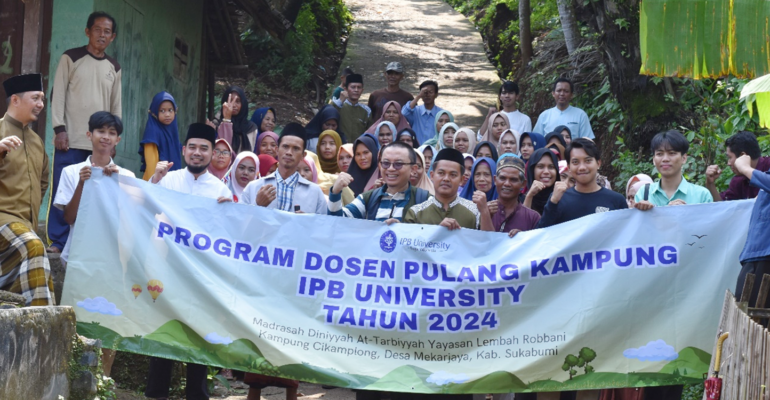IPB University’s Dosen Pulang Kampung Program Introduces Waqf Village Concept and Corn Development in Sukabumi

IPB University’s Dosen Pulang Kampung Program (Dospulkam) successfully held its inaugural visit in Cikamplong Village, Mekarjaya Village, Sukabumi Regency. This activity was mostly attended by the guardians of Madrasah At Tarbiyah, Cikamplong.
This visit was an important first step in introducing the concept of Waqf Village and the utilization of corn as a potential commodity to advance the village’s agriculture-based economy.
The event presented three speakers who provided a comprehensive understanding of the Waqf Village concept and the potential of corn as a strategic crop,
Dr Asep Nurhalim, as the leader of the Dospulkam team, Dr Soni Trison and Dr Khalifah Muhammad Ali.
In the corn utilization socialization session, Dr Asep Nurhalim explained the plan to make Cikamplong Village a model of corn development that successfully utilizes local potential to improve economic standards.
“By starting planting and processing in the experimental area, the community of Kampung Cikamplong is expected to achieve economic independence, reduce dependence on external assistance, and create sustainable positive impacts. This maize development model is designed to extend economic and social benefits to the entire village,” said Dr Asep.
Meanwhile, Dr Soni explained the plan to utilize maize as a superior commodity. “Maize has great potential to be optimized as a source of community income,” he said.
He underlined the importance of applying modern cultivation techniques and processing maize products to increase their added value. “Corn utilization strategies include optimal planting with modern techniques, as well as processing corn products into various value-added forms such as flour, oil, and snacks,” he said.
Another speaker, Dr Khalifah Muhammad Ali, explained that the Waqf Village concept is an innovative idea for sustainable development of villages through waqf. “The Waqf Village is expected to be a model for other villages in utilizing the potential of waqf for the welfare of the community,” said Dr Khalifah.
He emphasized that professional waqf management can be a sustainable source of income that supports the social and economic development of villages.
“The proceeds from this management can be used to fund various social needs such as education, health, and economic empowerment. Waqf villages also encourage the active participation of the community in managing waqf assets, so that they gain skills and responsibilities that will have a positive impact on improving their quality of life and welfare,” he said. (IAAS/ZQA)



















